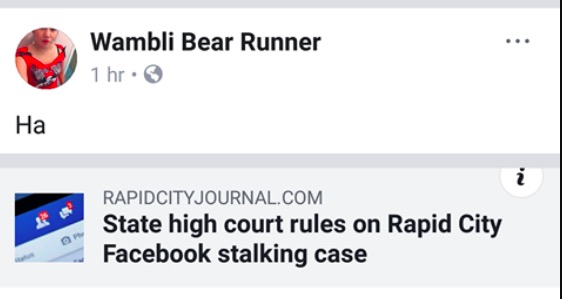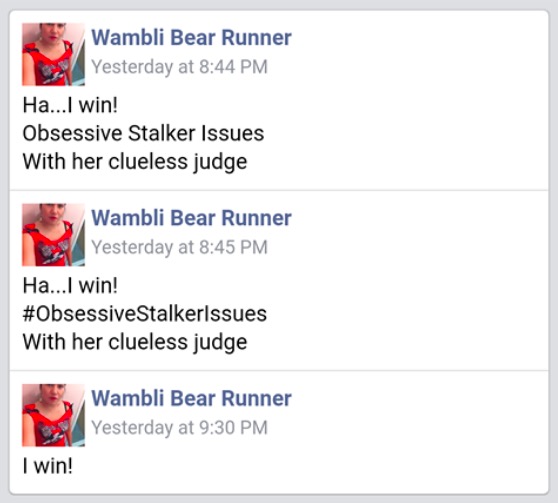Give someone too much guff on Facebook, and you can be busted for stalking, but you can still demand that the judge be specific about which guff goes to far. So says the South Dakota Supreme Court in Thompson v. Bear Runner, a decision handed down Wednesday.
Sarah Thompson and Wambli Bear Runner live across the street from each other in Rapid City. I hate to even get into the details, because it’s the kind of entirely personal, petty drama that I steer clear of on this blog and in the rest of my life. But, from the court’s narrative, the conflict appears to have bubbled out of Thompson’s dating of an ex-boyfriend of Bear Runner’s for three months in 2014. Bear Runner “initiated a heated text conversation” with Thompson in December 2014, then came back in March 2016 (already, I’m thinking, “It’s been over a year, the ex is out fo the picture—let it go!”) with a Facebook attack including a hashtagged “#yourenemy” (and my toxic-person alarm goes off). Thompson asked Bear Runner’s employer to do something about Bear Runner’s “cyberbullying,” but the employer declined to engage in personal problems (which, unless Bear Runner is using the office computer for Facebook, is probably my response, too).
Bear Runner kept up the online-smack campaign, using fake names to try Friending and messaging Thompson. Bear Runner branched out into workplace harassment in October 2016 by telling Thompson’s boss, apparently a medical provider of some sort, that Thompson had “participated in unethical conduct and misrepresentation” and was “violating the privacy and confidentiality of her employer’s patients.” At that point, Thompson went to the cops and filed for a protection order. Bear Runner kept attacking, with another complaint to Thompson’s employer and a Facebook post about Thompson’s son (at which point I say Bear Runner has absolutely crossed the line).
The circuit court didn’t grant a temporary protection order on the spot but did hold a hearing in January/February 2017, said, yup, that’s stalking, per South Dakota Codified Law 22-19A-1:
No person may:
- Willfully, maliciously, and repeatedly follow or harass another person;
- Make a credible threat to another person with the intent to place that person in reasonable fear of death or great bodily injury; or
- Willfully, maliciously, and repeatedly harass another person by means of any verbal, electronic, digital media, mechanical, telegraphic, or written communication.
A violation of this section constitutes the crime of stalking. Stalking is a Class 1 misdemeanor. However, any second or subsequent conviction occurring within ten years of a prior conviction under this section is a Class 6 felony [SDCL 22-19A-1, last amended 2006].
Bear Runner’s online speech sounds willful, malicious, and repeated to me. The circuit court thought so and issued a protection order after that hearing. Bear Runner appealed, saying the court failed to lay out the specifics of Bear Runner’s behavior that constituted stalking, that her actions weren’t stalking under South Dakota law, and that the protection order was too vague.
The South Dakota Supreme Court said the circuit court did err in failing to lay out the facts supporting the protection order. The circuit court findings “merely parrot statutory text” and didn’t specify which of Bear Runner’s actions warranted action. The Supreme Court quotes the circuit court judge, Jeff Connolly:
I don’t think that everything that I am finding was harassment or was conduct—was a course of conduct, not all of it—and I’m not sure o any of it, but certainly not all of it was protected activity as I sit here now. I can’t figure out—I mean, I’m not going to predict and say this is where the line is [Judge Jeff Connolly, quoted by SD Supreme Court, Thompson v. Bear Runner, 2018.07.18, p. 6].
Um, judge? I need a little more than that. The things the defendant said were vile, but if the state is telling us we can’t say stuff, we do need to know exactly which stuff that is.
The Supreme Court thus remanded the case back to circuit court without ruling on Bear Runner’s behavior or the alleged vagueness of the protection order. So note to judges: to minimize the time you have to spend hearing complainants reënact Jerry Springer in your courtroom, be specific.
Update 20:00 CDT: The defendant is publicly expressing her pleasure with the outcome:



My toxicity alarm continues to ring, but I’ll make two comments:
- “Win” is technically correct: the defendant “won” one of her three points. But she didn’t “win” in the sense that anyone has confirmed that her “stalking” belongs in mock quotes or that her case is done and she’s scot free.
- Given that the Supreme Court is sending the case back to Judge Connolly, now might not be the time for the defendant to go around publicly calling him an “idiot.”
Under chapter 22-19A, to harass another person means to engage in a “willful course of conduct” which serves “no legitimate purpose.”
http://www.sdlegislature.gov/Statutes/Codified_Laws/DisplayStatute.aspx?Type=Statute&Statute=22-19A-4
It’s impossible to evaluate the legality of Bear Runner’s conduct under this chapter without evaluating whether the conduct served any legitimate purpose.
When Judge Rodney Steele issued a two-year restraining order against me in 2003, his findings of fact included nothing literally false that we could challenge. Essentially all he did was restate the events of April 9 and August 20 and say, “You’re a stalker.” He didn’t even mention the purpose of my conduct, which was to ask sincere questions, make truthful statements, and lighten up an awkward situation.
It’s more than a little unnerving to be effectively told, “You’ll be guilty of a felony if you do this again,” without having “this” clearly defined. Our appeal argued that the trial court’s findings of fact were insufficient. The state supreme court ruled that “… the issues on appeal are factual and there clearly is sufficient evidence to support the findings of fact …” That ruling seems like the exact opposite of the truth. We didn’t appeal the facts. We couldn’t. The judge didn’t give us any facts we could appeal.
If Judge Steele had accused me of acting “maliciously” and then lying about it under oath, at least I would have known what was happening to me, but no one ever explained what possible motive I could have had for acting maliciously toward my accuser. The judge seemed to be saying my actions met the legal definition of stalking in themselves, even if everything I’d said in my testimony was true. Unfortunately I have no way to know for sure what the judge was trying to say.
Anyway, I’m glad to see Wednesday’s ruling. Hopefully it will set a precedent that protects others from the kind of social and financial devastation that was inflicted on me.
Just curious, who is responsible for the court costs and attorney fees in this case?
Mr. Evans, thanks for making the case for others and me to stay anonymous. The last thing in the world I want is to have you, Wambli or anyone else raising hell and stalking me. Appreciate it and next time someone like Nelson brings that up, I will back it up with your post.
Kurt, if I read this case and your comment correctly, it sounds like this court would have booted your case back to Judge Steele for clarification. I agree: if the court is going to abridge my First Amendment rights because of things I said in the past, I want to know exactly what those things are so I don’t say them again (at least not in law enforcement’s hearing).
TimA, I don’t think I saw any mention of court costs in this case. That’s certainly an issue that keeps me from seeking court action against folks who harass me online: I don’t want to waste any money on a lawyer, and so far, what harassment I have endured online has been more inexpensively dealt with by ignoring the SOBs or hitting “Block” than trying to go pro se to the courthouse. That’s not to say that Thompson’s efforts aren’t justified: when someone is calling your boss and putting your job in jeopardy with lies, action is necessary, and I’d argue that by provoking Thompson to have to take such measures, a judge could reasonably require the convicted stalker to pay for the trouble.
Kurt, hate to ask, but can you enlighten us as to what happened with court costs and attorney fees in your case?
Jerry, for what it’s worth, I’ve given Kurt a hard time on many issues, and I have never caught him stalking me. He’s contacted me a few times, but never harassed me.
Update! I’ve added screen caps to the original post showing the defendant’s celebration of her “win”.
I would urge the employer to take some minor action if an employee came to her supervisor complaining of harassment or stalking. Have contact information available from the nearest domestic violence shelter to hand to that employee so that they have a resource.
In fact, the domestic violence shelter almost certainly has significant information on stalking. The employer might increase employee productivity by scheduling a 30 minute on site seminar led by a representative of the DV shelter. This would increase productivity by helping employees feel safer.
If a seminar is not possible, at least the employer can keep available a DV Shelter provided handout on stalking. When one feels real danger, having an employer who figuratively throws up his hands and says there is nothing he can do is certainly not going to enhance the workplace or that employee’s skill level.
Cory writes:
The judge in my case didn’t seem to be an idiot, but he did seem to be much more interested in appeasing SDSU officials and covering for the campus police than he was in upholding the law.
That may be what the 2004 court would have done if the attorney general’s office hadn’t intervened in my appeal and overwhelmed me with more lies than I could afford to answer.
Ya think? :-)
Under chapter 22-19A, the legal definition of harassment is supposed to exclude constitutionally protected activity.
http://www.sdlegislature.gov/Statutes/Codified_Laws/DisplayStatute.aspx?Type=Statute&Statute=22-19A-5
You seem to be blurring the distinction between a conviction for stalking (which requires criminal charges, prosecution, and a finding of guilt beyond a reasonable doubt) and a restraining order for stalking (which requires only an accusation and a judge’s finding by a mere preponderance of the evidence, with no right to a jury trial). They’re really different.
That raises another point about my case. I admitted to everything in the judge’s findings of fact, and the attorney general’s office argued in the appeal that those facts met the legal definition of stalking. If they’d really believed that, wouldn’t they have had a moral obligation to file charges?
My attorney fees were my obligation. My accuser didn’t have any attorney fees. Judge Steele allowed SDSU women’s basketball coach Aaron Johnston to illegally represent her and cross-examine me in the circuit court hearing, and other SDSU personnel persuaded Larry Long to have the attorney general’s office represent her at taxpayer expense in the appeal. I’d assume court costs also fell on the taxpayers.
One dictionary definition of harass is “to create an unpleasant or hostile situation for [someone] especially by uninvited and unwelcome verbal or physical conduct.” I routinely create unpleasant situations for people by uninvited verbal conduct. So did Christ. It got Him killed. In America the Constitution theoretically protects that kind of harassment.
Judging from the comment “jerry” made above, I may have already created an unpleasant situation for him by my comments here. I don’t willfully engage in conduct that serves “no legitimate purpose,” though, and that’s the legal definition that was supposed to be applied to me under chapter 22-19A.
No problem for me man, as I said, after reading what you wrote, it only shows why I stay anonymous. I am good on my own and in my own “jerry”, thank you very much…
On blurring—indeed, I may be in error. Odd that a protection order and conviction don’t go together: if one is engaging in criminal behavior that justifies a protection order, does the state not go further and prosecute and seek criminal conviction?
When someone does the touchdown dance at the 10 yard line it’s funny. Wambli Bear Runner is funny.
I’d written to Cory:
Cory writes:
Here’s a related question. If the attorney general’s office doesn’t have the evidence to even charge someone with stalking—let alone convict him—should they really be destroying his reputation and his teaching career by throwing the full weight of their office onto the scales of “justice” in the appeal of a civil restraining order?
But it’s worse. The attorney general’s office argued to the state supreme court that it should be allowed to intervene at taxpayer expense in my appeal because the case involved “protection of a victim of stalking, where there was no prior relationship of any sort between the stalker and his victim.” And the court allowed it. So much for the presumption of innocence.
If I weren’t such a good Christian, I’d probably call them a bunch of crooked, lying scumbags. :-)
I’ll admit, Kurt’s point has me wondering about protection orders and convictions. I understand we should have some mechanism to protect individuals from clear and present danger that perhaps works faster than the full judicial process of prosecuting and convicting a crime. But just as I revile the crime victims amendment for denying accused individuals of their rights and affording certain individuals “victims” rights before the state has proven the occurrence of any crime or the existence of any “victim”, should I not also revile protection orders that deny individuals rights without any finding of a crime committed?
Maybe I shouldn’t talk myself into too much of a corner. We are denying Maria Butina of her liberty right now, even though she hasn’t been convicted, because we have a strong belief she was up to no good and will try to flee before we have a chance to hold a fair trial. We infringe on all sorts of rights pre-conviction, because they make sense and keep us safe. How are protection orders any different?
Cory writes:
One important difference is that a restraining order for stalking isn’t merely issued before conviction or before we have a chance to hold a trial. It’s often issued when there will never be a trial because no one will ever be criminally charged.
After a brief, rushed hearing in 2003, one seemingly constipated circuit judge has effectively condemned me to spend most of my 30s and 40s in a desperate struggle against debt and extreme social isolation, and any action I’ve taken to defend myself has only made the situation worse. If Maria Butina is as innocent as I was, she’ll likely spend her 30s and 40s raising a family and reaping the benefits of a multimillion-dollar book deal.
Never underestimate the value of a jury trial.
Kurt, I’d say write a book, sign a movie deal… but you’re not as handsome as Maria Butina. (Nothing personal—I’m just thinking like a producer.)
I smiled a lot at Butina’s age too, Cory. If she’s innocent but loses in court, she might end up looking as bad at 48 as I do. :-)
Kurt, let’s not wish our late-forty looks on anyone. Let’s be content with justice and democracy taking its course and responding properly to this threat to national security.
Let’s also hope the Russians can’t turn around and charge me with stalking Butina online. She’s a public figure, right?
Cory writes:
I’m thinking the “public figure” thing applies to defamation, not stalking. In South Dakota anyone could walk to the courthouse, accuse you of stalking, and fill out an application for a restraining order against you. I’ve been told by a South Dakota attorney that you’d be placed under a temporary restraining order almost automatically, at least until the hearing.
After the hearing, my experience suggests you’d be facing something of a crapshoot.
Hmm… so does journalistic coverage cross all of the lines that Bear Runner crossed with Thompson? Bear Runner contacted Thompson directly to harass her online; I have yet to engage in any direct communication with Butina (though I’d be glad to). Bear Runner contacted Butina’s employer and tried to put her job at risk; I have taken no comparable action.
Wambli …..since this isn’t old news but hardly recent hope it is still doing well for you….HMU I am totally social media free and in a way it sucks but I’m a way it forces you to be creative and persistent about finding ways to get a hold of someone ….if you see this and want to do lunch or get coffee n catch up I don’t believe you would be disappointed as I said catching up w an old friend😇!f you see this and it doesn’t have a way to get at me let me know…. your friend always Ry:)